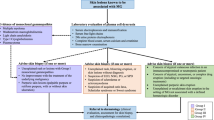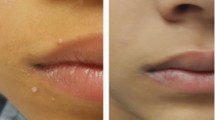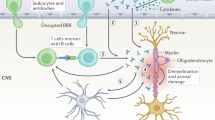Abstract
MUCH of the available experimental evidence1,2 suggests that pathological demyelination in the human brain might occur as a result of a delayed-type hypersensitivity reaction against myelin3,4, although a significant role of circulating antibody cannot be altogether ruled out5,6. Previously7,8 we reported that we had been able to elicit a skin reaction against proteolipid A derived from human brain in 21 cases of multiple sclerosis and two patients with clinically diagnosed neuroses which was in agreement with the results obtained by other investigators9,10 who had tested skin reactivity against unpurified human myelin. While the pathognomonic significance of the skin reaction thus remains doubtful we endeavoured to examine the question whether a true hypersensitivity reaction was present or not by comparing a large number of adult patients with a group of children suffering from a variety of central nervous system disorders as to their ability to react against myelin.
This is a preview of subscription content, access via your institution
Access options
Subscribe to this journal
Receive 51 print issues and online access
$199.00 per year
only $3.90 per issue
Buy this article
- Purchase on Springer Link
- Instant access to full article PDF
Prices may be subject to local taxes which are calculated during checkout
Similar content being viewed by others
References
Shiraki, H., in Kies, M. W., and Alvord, E. C., ‘Allergic’ Encephalomyelitis, 522 (Chas. Thomas Pub., Springfield, Ill.)
Robbins, F. C., in Kies, M. W., and Alvord, E. C., ‘Allergic’ Encephalomyelitis, 457 (Chas. Thomas Pub., Springfield, Ill.)
Åström, K. E., and Waksman, B. H., J. Path. Bact., 83, 899 (1962).
Waksman, B. H., in Kies, M. W., and Alvord, E. C., ‘Allergic’ Encephalomyelitis, 419 (Chas. Thomas Pub., Springfield, Ill.)
Field, E. J., Brit. J. Exp. Path., 42, 303 (1961).
Kibler, R. F., and Barnes, A. E., J. Exp. Med., 116, 807 (1962).
Böhme, D., Paal, G., and Kersten, W. and H., Nature, 197, 609 (1963).
Paal, G., Böhme, D., and Kersten, W. and H., Deutsch. Z. Nervenheilk., 184, 235 (1963).
Stauffer, R., and Waksman, B. H., Ann. N.Y. Acad. Sci., 58, 541 (1954).
Bauer, H., and Heitmann, R., Deutsch., Z. Nervenheilk., 178, 47 (1958).
Folch, J., and Lees, M., J. Biol. Chem., 151, 807 (1951).
Laatsch, R. H., Kies, M. W., Gordon, S., and Alvord, E. C., J. Exp. Med., 115, 777 (1962).
Vaccari, F., Baldini, E., and Fontana, G., Acta Hæmat., 28, 352 (1962).
Author information
Authors and Affiliations
Rights and permissions
About this article
Cite this article
BÖHME, D., PAAL, G., KERSTEN, W. et al. Skin Reaction in Children and Adults with Central Nervous System Disease after Intracutaneous Administration of Myelin Preparations derived from Human Brain. Nature 199, 84–85 (1963). https://doi.org/10.1038/199084a0
Issue Date:
DOI: https://doi.org/10.1038/199084a0
This article is cited by
Comments
By submitting a comment you agree to abide by our Terms and Community Guidelines. If you find something abusive or that does not comply with our terms or guidelines please flag it as inappropriate.



